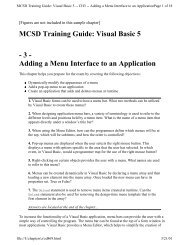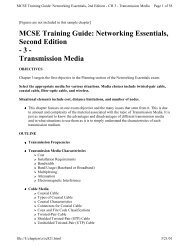SOCIAL PROBLEMS: A Down-to-Earth Approach, 8/e
SOCIAL PROBLEMS: A Down-to-Earth Approach, 8/e
SOCIAL PROBLEMS: A Down-to-Earth Approach, 8/e
Create successful ePaper yourself
Turn your PDF publications into a flip-book with our unique Google optimized e-Paper software.
SUMMARY AND REVIEW<br />
1. Sociologists use what is called the sociological imagination<br />
(or perspective) <strong>to</strong> view the social problems that<br />
affect people’s lives. This means that they look at how<br />
social locations shape people’s behavior and attitudes.<br />
2. A social problem is some aspect of society that people<br />
are concerned about and would like changed. It consists<br />
of objective conditions, things that are measurable,<br />
and subjective concerns, the feelings and attitudes that<br />
people have about those conditions. Social problems<br />
are relative—one group’s solution may be another<br />
group’s problem.<br />
3. Social problems go through a natural his<strong>to</strong>ry of four<br />
stages that often overlap: defining the problem, crafting<br />
an official response, reacting <strong>to</strong> the official response,<br />
and pursuing alternative strategies.<br />
4. Sociologists are able <strong>to</strong> make five contributions <strong>to</strong> the<br />
study of social problems: They can help determine the<br />
extent of a social problem, clarify people’s attitudes <strong>to</strong>ward<br />
social problems, apply the sociological imagination<br />
<strong>to</strong> social problems, identify potential social<br />
No sociologist is going <strong>to</strong> support such positions, but I think you get the point.<br />
Whenever someone takes a position on a social problem and advocates one solution or<br />
another, values of some sort underlie that person’s views. Should sociologists, then, as<br />
sociologists, advocate or promote solutions <strong>to</strong> social problems?<br />
TAKING SIDES: DIVISIONS AND AGREEMENT. This question of taking sides as professionals<br />
divided U.S. sociology during the Vietnam War—and it has done so again with Gulf War II.<br />
Some sociologists are convinced that professional associations such as the Society for the Study<br />
of Social Problems should make public antiwar pronouncements; others, in contrast, feel just<br />
as strongly that such a position is out of order. Although wars come and go and issues change,<br />
this broad cleavage among sociologists remains. Some say that sociologists should work<br />
<strong>to</strong>ward changing society in order <strong>to</strong> help the less powerful; others are just as convinced that<br />
sociology’s proper role is only <strong>to</strong> investigate and report objectively. They say that if sociologists<br />
want <strong>to</strong> take sides on any issue, they should do so as private citizens, not as sociologists.<br />
This debate keeps sociologists sensitive <strong>to</strong> the boundaries between objectivity and<br />
partisanship. Although there is little room for middle ground, most sociologists attempt<br />
<strong>to</strong> resolve this dilemma by separating the evidence on social problems from their own<br />
values and opinions. What they observe and measure, they attempt <strong>to</strong> report dispassionately<br />
and <strong>to</strong> analyze as accurately as possible. They try <strong>to</strong> be explicit when they move from neutral<br />
description <strong>to</strong> a value position.<br />
Despite their disagreements about taking sides on social problems, sociologists agree that<br />
they are in a unique position <strong>to</strong> study social problems and that they should produce thorough<br />
and objective studies. Sociologists do possess the <strong>to</strong>ols <strong>to</strong> do such research, and their<br />
studies can be valuable for both the public and policy makers.<br />
A PERSONAL NOTE. As the author of this book, I sincerely hope that the coming chapters<br />
help you <strong>to</strong> acquire a sociological imagination that will allow you <strong>to</strong> work <strong>to</strong>ward creative<br />
solutions for the pressing social problems we face. Sociologists can provide facts on<br />
objective conditions, sensitize you <strong>to</strong> the broader context that nourishes social problems,<br />
and suggest the likely consequences of intervention. Your decisions about what should be<br />
done about a social problem, however, will have <strong>to</strong> be made according <strong>to</strong> your values.<br />
policies for dealing with social problems, and evaluate<br />
likely consequences of those policies.<br />
5. The sociological understanding of a social problem<br />
differs from a commonsense understanding because<br />
the sociological perspective is not based on emotions<br />
or personal values. Instead, sociologists examine how<br />
social problems affect people, view the causes of social<br />
problems as located in society rather than in individuals,<br />
and use scientific methods <strong>to</strong> gather information<br />
about social problems.<br />
6. To study social problems, sociologists use four major<br />
research designs: surveys, case studies, experiments, and field<br />
studies. Sociologists gather information in four basic ways:<br />
interviews, questionnaires, documents, and observations.<br />
These methods are often used in combination.<br />
7. Because social problems can be viewed from so many<br />
vantage points, sociologists disagree on whether they<br />
should choose sides as professionals. They do agree,<br />
however, that sociological studies must provide objective,<br />
accurate, and verifiable data.<br />
22 CHAPTER 1 HOW SOCIOLOGISTS VIEW <strong>SOCIAL</strong> <strong>PROBLEMS</strong>: THE ABORTION DILEMMA
















